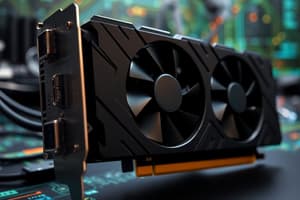Podcast
Questions and Answers
A modern GPU is capable of performing approximately 36 trillion calculations per second. Which of the following analogies BEST represents this computational power?
A modern GPU is capable of performing approximately 36 trillion calculations per second. Which of the following analogies BEST represents this computational power?
- The population of 4,400 Earths, with each person performing one calculation per second. (correct)
- The population of one Earth, with each person performing one calculation per second.
- A small town with each resident performing one calculation per second.
- A single person performing one calculation per second.
What is the primary architectural difference that allows a GPU to excel in processing large amounts of data compared to a CPU?
What is the primary architectural difference that allows a GPU to excel in processing large amounts of data compared to a CPU?
- GPUs are more flexible and can run a wider variety of programs than CPUs.
- GPUs have a massive number of cores designed for parallel processing of simple calculations. (correct)
- GPUs can handle operating systems and network connections, while CPUs cannot.
- GPUs have significantly fewer processing cores, enabling faster individual calculations.
The GA102 GPU chip is used in several graphics card models (e.g., 3080, 3090). What is the MAIN reason for performance variations among these cards despite using the same chip design?
The GA102 GPU chip is used in several graphics card models (e.g., 3080, 3090). What is the MAIN reason for performance variations among these cards despite using the same chip design?
- The chips are binned (categorized) based on defects, leading to variations in usable cores and clock speeds. (correct)
- The clock speed of the CUDA cores is significantly different on each card model.
- Different card models use different types of graphics memory (e.g., GDDR6 vs. GDDR6X).
- The number of Graphics Processing Clusters (GPCs) varies between different card models.
Within a single Streaming Multiprocessor (SM) of a GA102 GPU, what is the ratio of CUDA cores to Tensor cores?
Within a single Streaming Multiprocessor (SM) of a GA102 GPU, what is the ratio of CUDA cores to Tensor cores?
If a graphics card has 9000 CUDA cores running at 1.5 GHz, approximately how many calculations per second can it perform?
If a graphics card has 9000 CUDA cores running at 1.5 GHz, approximately how many calculations per second can it perform?
Which component of a GPU is specifically responsible for managing the scheduling and distribution of threads and tasks across the GPU's processing units?
Which component of a GPU is specifically responsible for managing the scheduling and distribution of threads and tasks across the GPU's processing units?
A graphics card receives 12V power from the power supply but requires 1.1V to operate the GPU chip. Which component is responsible for this voltage conversion?
A graphics card receives 12V power from the power supply but requires 1.1V to operate the GPU chip. Which component is responsible for this voltage conversion?
What is the PRIMARY function of the GDDR6X SDRAM memory chips found on a high-performance graphics card?
What is the PRIMARY function of the GDDR6X SDRAM memory chips found on a high-performance graphics card?
Which of the following best describes the key difference between SIMD and SIMT architectures in GPUs?
Which of the following best describes the key difference between SIMD and SIMT architectures in GPUs?
What is the primary function of tensor cores in modern GPUs, and how do they achieve increased efficiency?
What is the primary function of tensor cores in modern GPUs, and how do they achieve increased efficiency?
In the context of GPU architecture, what is the relationship between a warp, a thread block, and a grid?
In the context of GPU architecture, what is the relationship between a warp, a thread block, and a grid?
How does PAM-3 encoding contribute to the enhanced performance of GDDR7 memory?
How does PAM-3 encoding contribute to the enhanced performance of GDDR7 memory?
Why have ASICs (Application-Specific Integrated Circuits) largely replaced GPUs in Bitcoin mining?
Why have ASICs (Application-Specific Integrated Circuits) largely replaced GPUs in Bitcoin mining?
What is the role of the nonce in the SHA-256 hashing algorithm used in Bitcoin mining, and why is it crucial for the mining process?
What is the role of the nonce in the SHA-256 hashing algorithm used in Bitcoin mining, and why is it crucial for the mining process?
How does HBM (High Bandwidth Memory) achieve high bandwidth and reduced power consumption compared to traditional memory architectures?
How does HBM (High Bandwidth Memory) achieve high bandwidth and reduced power consumption compared to traditional memory architectures?
Suppose a graphics card can generate 95 million SHA-256 hashes per second. Approximately how many hashes can it generate in one minute?
Suppose a graphics card can generate 95 million SHA-256 hashes per second. Approximately how many hashes can it generate in one minute?
Flashcards
GDDR7
GDDR7
The latest generation of graphics memory that uses PAM-3 encoding for higher bandwidth.
HBM
HBM
High Bandwidth Memory, which consists of stacked DRAM chips for AI, offering high bandwidth and reduced power consumption.
SIMD
SIMD
Single Instruction Multiple Data; executes the same instruction on multiple data points simultaneously.
SIMT
SIMT
Signup and view all the flashcards
Thread
Thread
Signup and view all the flashcards
Warp
Warp
Signup and view all the flashcards
Tensor Cores
Tensor Cores
Signup and view all the flashcards
Ray Tracing Cores
Ray Tracing Cores
Signup and view all the flashcards
GPU performance
GPU performance
Signup and view all the flashcards
GPU vs. CPU
GPU vs. CPU
Signup and view all the flashcards
GA102 GPU Chip
GA102 GPU Chip
Signup and view all the flashcards
CUDA Cores
CUDA Cores
Signup and view all the flashcards
GDDR6X Memory
GDDR6X Memory
Signup and view all the flashcards
Graphics Memory Controllers
Graphics Memory Controllers
Signup and view all the flashcards
NVLink Controllers
NVLink Controllers
Signup and view all the flashcards
Heat Sink
Heat Sink
Signup and view all the flashcards
Study Notes
Graphics Card Performance
- A modern graphics card performs approximately 36 trillion calculations per second.
- This can be visualized as 4,400 Earths filled with people, each performing one calculation every second.
GPUs vs. CPUs
-
GPU:
- Possesses a massive number of cores (exceeding 10,000).
- Processes large datasets at a slower rate compared to CPUs.
- Highly optimized and specialized for performing simple calculations.
- Less adaptable than CPUs, limited to specific tasks.
-
CPU:
- Features a smaller number of cores (e.g., 24).
- Handles small data volumes at a faster rate.
- More versatile, capable of running diverse programs and instructions.
- Manages operating systems, network connections, and a wide array of applications.
The GA102 GPU Chip
- Contains over 28.3 billion transistors.
- Structured into 7 Graphics Processing Clusters (GPCs).
- Each GPC comprises 12 Streaming Multiprocessors (SMs).
- Each SM includes:
- 4 warps.
- 1 ray tracing core.
- 32 CUDA cores.
- 1 tensor core.
- Total cores: 10,752 CUDA cores, 336 tensor cores, and 84 ray tracing cores.
- Different graphics card models (e.g., 3080, 3090) utilize the same GA102 chip design. Variations in performance stem from binning, which categorizes chips based on defects.
CUDA Cores
- Execute fundamental binary calculations (e.g., addition, multiplication).
- Primarily used in video game development.
- Each core performs one multiplication and one addition operation per clock cycle.
- A 3090 graphics card, with 10,496 CUDA cores operating at 1.7 GHz, achieves approximately 35.6 trillion calculations per second.
Other GPU Chip Components
- Graphics Memory Controllers: Manage data transmission between the GPU and memory.
- NVLink Controllers: Facilitate high-speed communication between GPUs.
- PCIe Interface: Connects the GPU to the motherboard.
- Level 2 SRAM Memory Cache: Provides a small, high-speed cache for frequently accessed data.
- Gigathread Engine: Manages the scheduling of threads and tasks across the GPU.
Graphics Card Components
- Ports: For connecting display devices.
- Power Connector: Provides power to the GPU.
- PCIe Pins: Connect the graphics card to the motherboard.
- Voltage Regulator Module: Converts 12V to 1.1V for powering the GPU.
- Heat Sink: Dissipates heat from the GPU and memory chips.
- Memory Chips: GDDR6X SDRAM, storing the data utilized by the GPU.
Graphics Memory
- GDDR6X: The memory type in a 3090 graphics card.
- GDDR7: The latest memory generation, leveraging PAM-3 encoding for enhanced bandwidth.
- HBM (High Bandwidth Memory): Stacked DRAM chips, prevalent in AI chips, offering high bandwidth and reduced power consumption.
Embarrassingly Parallel Programming
- SIMD (Single Instruction Multiple Data): Executes the same instruction on multiple data points concurrently.
- SIMT (Single Instruction Multiple Threads): An enhancement of SIMD, enabling threads to progress at varying speeds, offering flexibility.
- Thread: Represents a single instruction being executed.
- Warp: A group of 32 threads that execute identical instructions in unison.
- Thread Block: A collection of warps acting on the same streaming multiprocessor.
- Grid: The overarching set of thread blocks executed across the entire GPU.
SIMD vs. SIMT
- SIMD: All threads within a warp execute synchronously. Common in older GPUs.
- SIMT: Threads can progress at varying speeds, leading to enhanced flexibility and efficiency in more modern GPUs.
Implications of SIMD and SIMT
- Video Games: Used for transformations, rendering, and other parallel operations found in video games.
- Bitcoin Mining: Used to perform complex calculations needed for cryptocurrencies like Bitcoin.
- AI: Used for processing and developing neural networks.
Utilizing GPUs for Bitcoin Mining
- Bitcoin mining creates blockchain blocks utilizing the SHA-256 hashing algorithm.
- The SHA-256 algorithm processes transaction data, timestamp, additional data, and a nonce to produce a 256-bit, random output.
- GPUs were initially used for Bitcoin mining due to their ability to run thousands of SHA-256 iterations with varied nonces, analogous to generating multiple lottery tickets.
- The winning "lottery ticket" includes the first 80 bits as zeros.
- The reward for mining a block is 3 Bitcoin.
- A graphics card can produce approximately 95 million SHA-256 hashes per second.
- ASICs (Application-Specific Integrated Circuits) are now frequently used in Bitcoin mining for greater efficiency. ASICs can perform 250 trillion hashes per second.
Tensor Cores and Matrix Multiplication
- Tensor cores are designed for matrix multiplication and addition.
- Accepting three matrices as input, they perform the multiplication of the first two matrices and add the result to the third.
- All values within the matrices are processed concurrently for enhanced efficiency.
- Crucial for neural networks and generative AI due to their extensive matrix computations involving large matrices.
Ray Tracing Cores
- Ray Tracing Cores are specialized for realistic rendering and lighting calculations in computer graphics.
- They function by simulating the paths of light rays within a virtual environment, culminating in more photorealistic visuals.
Studying That Suits You
Use AI to generate personalized quizzes and flashcards to suit your learning preferences.




